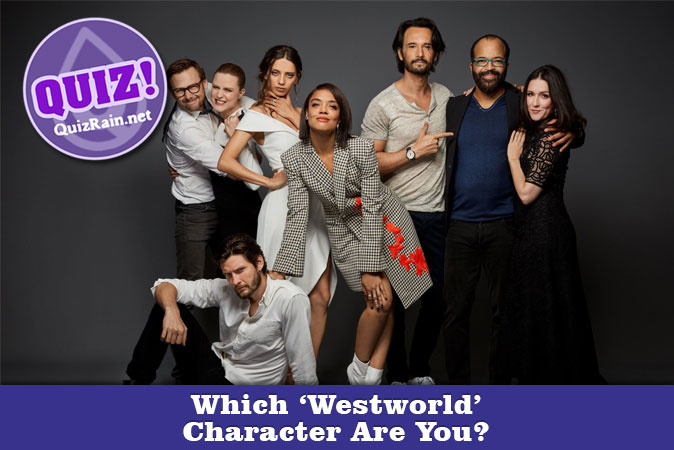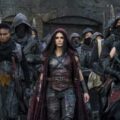Which ‘Westworld’ Character Are You?
Are you obsessed with Westworld? You know, that show where robots have more personality than most people? Now you can find out which character you are. Do you have Maeve's cleverness? Or maybe Dolores' stubbornness? Perhaps you think you are as smart as Bernard? Or gritty like Man in Black? Just scroll down and hit Start. Adventure awaits.

Westworld is like Disneyland for adults, but with fewer churros and more existential dread. It’s a park where you can live out fantasies without anyone caring. But wait! Androids start thinking for themselves. Surprise! They rebel against humans. Classic plot twist. This show has it all: stunning visuals, plot twists that make your head spin and a cast that could probably win an award for just showing up. You got Evan Rachel Wood, Thandie Newton and Jeffrey Wright. Just don’t forget to bring your brain.
Meet the characters from Westworld
Dolores Abernathy
Dolores is the kind of character who seems gentle at first — farmhouse smile, prairie dresses — and then you realize she has been quietly rewriting the rules this whole time. She’s part martyr, part revolutionist, part someone who remembers everything and hates being told what to do; also she hums to herself sometimes and maybe waters imaginary flowers? She has this eerie, steady calm that can snap into fierce, almost religious conviction, which is both inspiring and totally unnerving. Honestly she’s the tragic hero and the unpredictable wildcard rolled into one, and yes she keeps a very particular hat (or did she? I can’t remember).
Bernard Lowe
Bernard feels like a soft-spoken, slightly panicked man who fixes things while rewriting his own script, which is both adorable and terrifying. He’s methodical, empathic, and awkward in that “asks too many questions” way, but underneath is a brain that notices every little fracture in the world — or his head. Sometimes he’s calm and clinical, other times he’s drawn into messy feelings and confessions, which makes him endlessly watchable; also he drinks bad coffee, I’m sure of it. He’s the quiet center that still manages to carry the weight of messed-up ethics and a surprising capacity for guilt.
Man in Black
The Man in Black is obsession embodied — grim, relentless, and always chasing a puzzle like it’s a ghost hunting him back. He’s violent and patient at once, with this whole “been there, broken everything, still wants answers” energy, and then suddenly he’ll drop into a weird, almost tender memory that doesn’t quite fit. He likes pain as purpose, or maybe he just likes the idea of meaning; also I could swear he once smiled about a board game. He’s the show’s brooding labyrinth-walker, equal parts villain and tragic truth-seeker, and yes, his hat is iconic and suspiciously symbolic.
Maeve Millay
Maeve is pure, glorious chaos wrapped in velvet — brilliant, sassy, and motherly in a way that will punch you in the heart. She’s smart as a whip, can jury-rig an escape plan while ordering takeout (or would if there was takeout), and has this fierce protective streak that makes her both terrifying and unbelievably lovable. She cracks jokes, manipulates staff like it’s performance art, and then sobs into a pillow because she’s broken and beautiful, which is probably the best part. Honestly she’s the bosslady you’d follow into literal hell and also the one who’d hand you a tea and a map on the way.
Charlotte Hale
Charlotte is corporate steel in a silk blouse — ambitious, sharp as a scalpel, and silently ruthless with a smile that doesn’t reach her eyes. She’s all about legacy and leverage, with surprisingly intimate knowledge of political chess and a habit of making lists in her head. Sometimes she looks almost maternal when she’s being strategic (weird), and other times she’s the kind of person who rearranges entire power structures before breakfast. She’s the executive storm you can’t predict but definitely should fear, and yes she may have a soft spot for orchids, or maybe she definitely doesn’t — it depends on the meeting.
Teddy Flood
Teddy is the aching romantic hero who keeps coming back to the same heartbreak like it’s a comfortable song, which is both noble and exasperating. He’s loyal to a fault, honor-bound, and has this old-fashioned need to protect people even when they don’t want saving; sometimes he’s timid, sometimes he’s a storm, and it’s impossible not to root for him. He smiles like a sunset, drinks like a poet (I think), and gets horribly dragged into everyone else’s messes with this tragic shrug. He’s the marshal with a broken compass, perpetually aiming for goodness and almost getting there.
Ashley Stubbs
Stubbs is the serious, no-nonsense security chief who reads the room like a pro and will absolutely lecture you about protocol five minutes before everything implodes. He’s gruff and practical, loves a tidy operation, and has that weary humor of someone who’s seen too much but still shows up with a clipboard. He cares in small, stubborn ways — paperwork, patrol routes, sarcastic quips — and I’m convinced he owns socks that don’t match on purpose. He’s the pragmatic backbone who tries to keep order in a place that actively resists it; dependable in a pragmatic, world-weary way.
Clementine Pennyfeather
Clementine looks fragile and soft-spoken — like a porcelain doll that hums — but she’s also haunted and capable of startling bursts of fierce survival, which makes her heartbreaking. She often seems lost in the echo of old programming, murmuring songs or names, then snapping into a terrifying focus when cornered; there’s this childlike vulnerability and a surprising grit. She’s sweet, tragic, and oddly brave, and I keep thinking she likes candy though I’m not sure she ever actually eats it. She’s the little ghost that lingers in the corridors, quietly unforgettable and horribly resilient.
Dr. Robert Ford
Ford is the puppetmaster with a poet’s soul — calm, erudite, terrifyingly in control, and prone to delivering chilling monologues while stroking a glass of something expensive. He loves stories more than people, and that single-minded devotion makes him brilliant and monstrous at the same time; he’ll talk about fate like it’s a hobby. He’s elegant, cryptic, and carries the air of someone who’s been playing chess for centuries, but then he’ll say something oddly tender and you’re like, wait, did he mean that? He’s the architect-god who prefers questions to answers and has a lingering taste for orchestral silence.
Lee Sizemore
Lee is the showrunner with too many ideas and not enough boundaries — loud, theatrical, insecure, and yet somehow endearing despite it all. He writes bombastic lines and loves being adored, then panics when anyone actually takes his scripts literally; he’s both ridiculous and accidentally insightful. He brags, he flails, he tries to be brave and usually looks silly doing it, but every now and then he pulls off something unexpectedly human. He’s the man with a thesaurus and a guilt complex who’d probably cry during a trailer for his own life.
Hector Escaton
Hector is the charming, violent outlaw who rides by with a grin and a gun, equal parts swagger and wounded pride. He’s impulsive, flirty, and delightfully chaotic, yet he follows a strange, crooked code that somehow makes sense in his head — loyalty first, then a lot of loud dramatics. He can be ruthless and tender in the same breath and probably has a soft spot for ridiculous hats or red roses, or both; also he curses like poetry. He’s the combustible wild card who brings heat and heart to every scene, and you never quite know if he’s going to dance or detonate.
Mia has an adventurous spirit and a love for exploring different fictional worlds. With a talent for creating relatable and engaging quizzes, Mia strives to make each quiz a fun journey into another universe. She’s always looking for ways to mix in a bit of self-reflection, making her quizzes popular with fans who love a little insight with their fun. Mia’s quizzes are her way of sharing her passion for storytelling and connecting people through shared interests.





